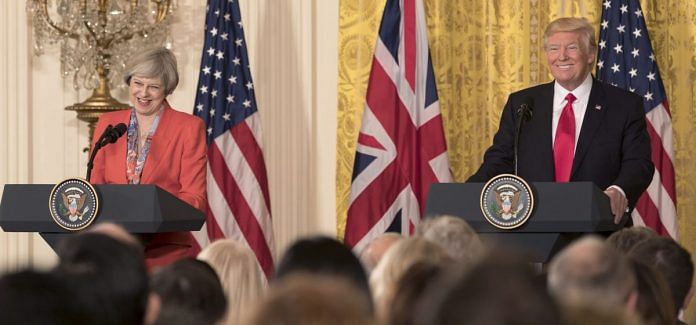At first sight, Trump and May are polar opposites. They behave differently, stand for different rights and have a distinctly different demeanour. However, the two leaders have recently come under scrutiny for their decisions. More importantly, their total lack of reasoning power and an ability to hold on to multiple contradictions by the sheer act of will is being questioned.
What do Theresa May and Donald Trump have in common?
“The stiff vicar’s daughter is of a different species to Trump’s flamboyantly bombastic vanity. But inside their brains they may share the same levels of nonsensical unreason that make them both a risk to their countries.”
“Her visa cap inflicts maximum harm in engineering, IT and all the industries Brexiters claim we will sell around the world. Recruitment to high-powered jobs of people from outside the EU is rising sharply, because the Brexit vote is deterring EU applicants.”
“This is a bee in May’s bonnet alone. What is she thinking?” writes Polly Toynbee for The Guardian.
“May’s implacable perversity was well observed by cabinet colleagues when she was home secretary. However hard they tried to reason with her, they always failed. They begged her to take students out of overall migration figures: it would bring down the headline figures, as they are not migrants but return home after graduating – and they bring funds for universities as well as vital future close relationships with wealthy trading nations. But nothing shifted her– even her prime minister couldn’t prevail. Why? No one knows. ”
“No wonder no Brexit progress has been made in two years.”
The royal wedding is forcing difficult conversations in America – about racism and mental health
“Markle’s relationship with Prince Harry has forced conversations about racism, the royal family and the British press, and it has seemingly given Harry space and confidence to talk about mental-health care and his own struggles in the wake of his mother’s death. We Americans may not always make the best use of our confessional culture, and we’ve hardly solved our own racial issues. But if we can give a little bit of openness to our former mother country, that’s a national wedding gift to be proud of.”
Like a lot of Americans, I am planning on prying myself out of bed at an unseemly hour on Saturday morning, make some tea in honour of the wedding and then watch it, writes Alyssa Rosenberg for The Washington Post.
“For Americans, one of the great pleasures of watching an event such as the royal wedding is the sense you are doing something slightly naughty and moderately ridiculous. It’s sort of like sneaking into a concert or torrenting a movie, without any of the actual consequences for the artists. We get to watch the spectacle without being required to pick up any of the substantial security costs (the Windsors pay for the “core aspects” of the wedding, but the public coffers end up getting tapped for things like police overtime).”
“On the other hand, it will serve as a reminder that, unlike the British with the Windsors, we Americans won’t be stuck with the Trump administration forever. True, the president is unlikely to retire quietly to the sidelines, observing the traditions of deference that have constrained his predecessors. But he’ll be representing only himself. And if he wants to make a ridiculous splash, he’ll have to spend his own money to do it.”
Israel must answer for the deaths in Gaza
But it is time for Palestinians to take up genuine non-violence writes the Economist.
“Many countries have denounced Israel; a few have recalled diplomats. Some people accuse it of war crimes. Others blame President Donald Trump for causing the clashes by moving the embassy from Tel Aviv to Jerusalem. It is surely right to hold Israel, the strong side, to high standards. But Palestinian parties, though weak, are also to blame. Seven decades after the creation of Israel as a thriving democracy, there is a better way than endless conflict and bloodshed.”
“Just as important is the broader political question. The fence between Gaza and Israel is no ordinary border. Gaza is a prison, not a state. Measuring 365 square kilometres and home to 2m people, it is one of the most crowded and miserable places on Earth. It is short of medicine, power and other essentials. The tap water is undrinkable; untreated sewage is pumped into the sea. Gaza already has one of the world’s highest jobless rates, at 44%. The scene of three wars between Hamas and Israel since 2007, it is always on the point of eruption.”
“For all their talk of non-violence, Hamas’s leaders have not abandoned the idea of “armed struggle” to destroy Israel. They refuse to give up their guns, or fully embrace a two-state solution; they speak vaguely of a long-term “truce”. With this week’s protests, Hamas’s leaders boasted of freeing a “wild tiger”. They found that Israel can be even more ferocious.”



